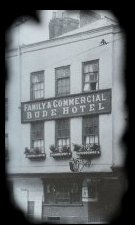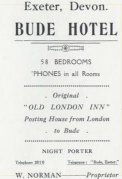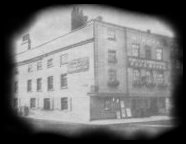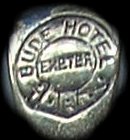The Bude Hotel, Dymond (1880) states that the London Inn
became the Bude Haven Hotel. (And later The Bude Hotel) which is shown over the road from the (New) London
Inn on the OS map of 1876.
 White (1850) lists a Bude Haven And Commercial Hotel in Sidwell Street. The resident is posted as Samuel Southcott, however the same place is listed as the Old London Inn in 1844. Donn's map of 1765 shows the London Inn at the top of Parrys Street (Paris Street)/ Sidwell Street. The advert below from the 1940's clears things up!  When the New London Inn opened in 1790, this London Inn was re-named the Old London Inn for obvious reasons. The inn prospered with the growth of coaching and the construction of new roads. A large yard was available for stabling 67 horses to the rear with further stabling available in nearby Longbrook Street. It was a major posting house, catering for runs to and from Bude in North Cornwall. In 1763, the proprietor, Isaac Moneypenyy held the record for getting to London in 2 days. When Moneypenny died, he was succeeded by John Land who went on to found the New London Inn. The Hotel was re-named the Bude Haven and Commercial Hotel between 1844 and 1852, becoming simply The Bude Hotel by 1889. The inn was bought by W.R. Gill in 1874 for 4100 GBP according to the Exeter Flying Post when it was named as the Bude Haven Hotel.  In 1833 during the cholera epidemic, complaints were made about the state of the inn's open sewers and the fact that pigs were kept in in the inn's out-houses. During the proprietorship of WT Norman, the hotel was often referred to as Normans' (after 1906). It became Ferris's the the name of Bude Bar and Cafe were kept for posterity. By 1927, the hotel had become a little run down and was losing money, attempts were made to sell at auction but these were unsuccessful (EE 2/5/1927). Exeter City Council bought the hotel in 1933 and promptly closed it for demolition in order to widen the Paris Street, High street, Sidwell Street junction. The irony is that, if they'd left it another 9 years, Adolf Hitler would've done it for them! 4th May 1942. With the hasty reconstruction of Exeter after WW2, a large Co-op store was built on the newly re-aligned High Street / Sidwell Street corner. This store later became Next, before being demolished by Land Securities in 2005. The picture below shows the hotel emblem from a silver teaspoon stolen from the hotel. Crime does sometimes pay!  It is possible that this inn was the famous Londonsyn or
Londysyn which originally dated back to 1358.
Stuart Callon Copyright ©2002-2005 |